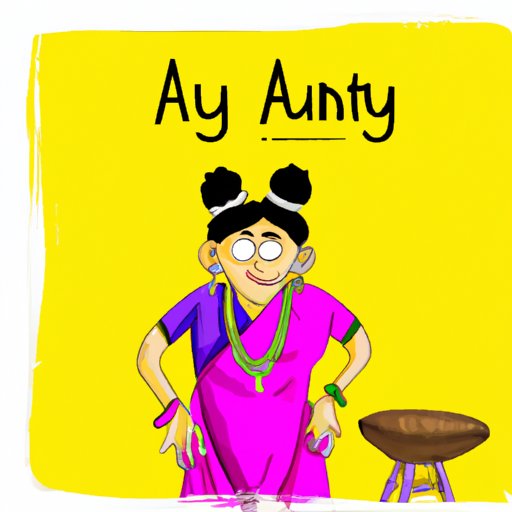Introduction
“Aunty” is a term used in Indian culture to refer to an older female relative or friend. In India, this term is used to show respect and gratitude to an older woman who is familiar to you. The exact meaning of the word “Aunty” can vary depending on the context in which it is used. This article seeks to explore the meaning of “Aunty” in Indian culture and its various implications for those encountering it for the first time.
Exploring the Meaning of Aunty in Indian Culture
In India, the word “Aunty” is used as a sign of respect and endearment for an older female relative or friend. It is often used as a way to show appreciation and gratitude for the guidance and wisdom that an older woman has provided. In some cases, the term may even be used for someone who is unrelated but is still considered to be part of the extended family due to their close relationship with the family.
The traditional role of Aunty in Indian society and family is one of great importance. Aunty is seen as a source of wisdom, guidance, and support. In Indian culture, it is believed that an Aunty is responsible for teaching younger generations about the traditions and customs of their culture. She is also seen as a protector and provider, offering advice and comfort when needed.
In addition to its traditional role, there is also a symbolic meaning behind the term Aunty in India. For many people, Aunty is seen as a representation of motherhood, as she embodies the same nurturing qualities that a mother would provide. Aunty is also seen as a symbol of strength and resilience, as she is often looked upon to provide emotional and physical support during difficult times.

Examining the Significance of Aunty in Indian Traditions and Customs
The significance of Aunty in Indian culture is evident in the various rituals and celebrations that are centered around her. For example, in some parts of India, it is customary for a bride to seek blessings from her Aunty before getting married. Aunty is also often invited to special occasions such as weddings, birthdays, and other important events. In some cases, she may even be given gifts as a token of appreciation for all that she has done.
Cultural expectations associated with Aunty vary depending on the region and family dynamics. Generally speaking, however, it is expected that an Aunty will provide emotional and physical support to her family members. She is also expected to uphold certain moral and ethical values and serve as an example of how to live a good life. In some cases, an Aunty may even be asked to provide financial assistance to her family if needed.

Understanding How Aunty is Used in Indian Language and Culture
The term Aunty is not only used to refer to an older female relative or friend, but is also used in everyday language and culture in India. Common idioms and slang terms related to Aunty include “Aunty-ji” (an affectionate term used to show respect) and “Aunty-ma” (a term used to refer to an older woman). These terms are often used in casual conversations and have become part of the Indian lexicon.
Examples of Aunty in Indian literature can also be found. In the classic novel “A Suitable Boy” by Vikram Seth, Aunty is portrayed as a wise and caring figure who provides guidance to the main characters. Similarly, in the play “Ma Rainey’s Black Bottom” by August Wilson, the character of Ma Rainey is referred to as Aunty and is seen as a strong and independent woman who stands up for what she believes in.
Conclusion
The term “Aunty” holds a special place in Indian culture. It is used as a sign of respect and endearment for an older female relative or friend and is seen as a source of wisdom, guidance, and support. Aunty is also a symbol of motherhood, strength, and resilience and is often the center of various rituals and celebrations. Moreover, the term is used in everyday language and culture and can be found in various forms of literature. For those encountering Aunty for the first time, understanding the significance of this term is essential for gaining insight into Indian culture.
(Note: Is this article not meeting your expectations? Do you have knowledge or insights to share? Unlock new opportunities and expand your reach by joining our authors team. Click Registration to join us and share your expertise with our readers.)
